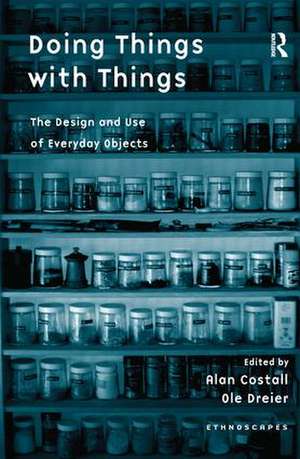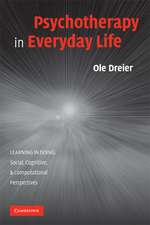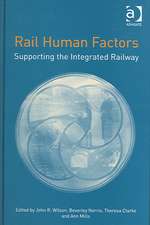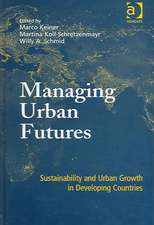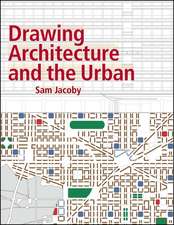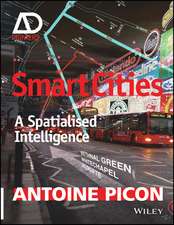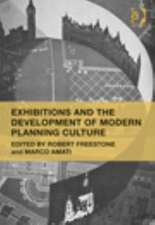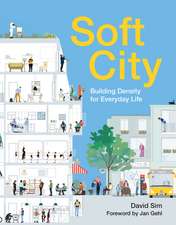Doing Things with Things: The Design and Use of Everyday Objects
Autor Ole Dreier Editat de Alan Costallen Limba Engleză Hardback – 28 sep 2006
| Toate formatele și edițiile | Preț | Express |
|---|---|---|
| Paperback (1) | 324.51 lei 43-57 zile | |
| Taylor & Francis – 9 sep 2016 | 324.51 lei 43-57 zile | |
| Hardback (1) | 823.08 lei 43-57 zile | |
| Taylor & Francis – 28 sep 2006 | 823.08 lei 43-57 zile |
Preț: 823.08 lei
Preț vechi: 1142.34 lei
-28% Nou
Puncte Express: 1235
Preț estimativ în valută:
157.55€ • 171.19$ • 132.42£
157.55€ • 171.19$ • 132.42£
Carte tipărită la comandă
Livrare economică 21 aprilie-05 mai
Preluare comenzi: 021 569.72.76
Specificații
ISBN-13: 9780754646563
ISBN-10: 0754646564
Pagini: 256
Dimensiuni: 156 x 234 x 19 mm
Greutate: 0.63 kg
Ediția:1
Editura: Taylor & Francis
Colecția Routledge
Locul publicării:Oxford, United Kingdom
ISBN-10: 0754646564
Pagini: 256
Dimensiuni: 156 x 234 x 19 mm
Greutate: 0.63 kg
Ediția:1
Editura: Taylor & Francis
Colecția Routledge
Locul publicării:Oxford, United Kingdom
Notă biografică
Alan Costall is Professor of Ecological Psychology at the University of Portsmouth, UK. Ole Dreier is Professor in the Department of Psychology at the University of Copenhagen, Denmark.
Recenzii
’There is growing consensus that human beings are inextricably interwoven with the artefacts and cultural practices that jointly constitute the unique medium of human life. This stimulating collection of essays provides a wealth of examples that embody this insight in a wide variety of settings. Costall and Dreier have organized a giant step forward toward the reintegration of the human sciences.’ Michael Cole, University of California, USA ’From psychology and linguistics to architecture, archaeology and material culture studies, the orthodoxy that isolated human minds confront a world of inert and meaningless objects is being challenged. This book takes up the challenge, showing how agency and intentionality arise as properties of the very relations that people set up in their lifelong, practical engagement with the things around them. The book is a must for anyone concerned with how things are designed, made and used.’ Tim Ingold, University of Aberdeen, UK '...I found this book to be interesting...would provide you with some foundational ideas.' Journal of Occupational Science '...insightful contributions to the growing body of academic work taking things more seriously and rethinking how people relate to objects.' Cultural Geographies
Cuprins
Introduction, Alan Costall, Ole Dreier; Part I Intentionality and the Functionality of Things; Chapter 1 The Case of the Recalcitrant Prototype, Beth Preston; Chapter 2 Use Plans and Artefact Functions: An Intentionalist Approach to Artefacts and their Use, Pieter E. Vermaas, Wybo Houkes; Part II Things in the World of the Child; Chapter 3 Autism and Object Use: The Mutuality of the Social and Material in Children’s Developing Understanding and Use of Everyday Objects, Emma Williams, Linda Kendell-Scott; Chapter 4 Object Use in Pretend Play: Symbolic or Functional?, Ágnes Szokolsky; Chapter 5 *The study was supported by Aarhus University, Denmark, the Danish Research Council for the Humanities and by Inge Lehmann’s Scholarship of 1983., Kristine Jensen de López; Part III Transformation and Things; Chapter 6 The Cognitive Biographies of Things, David de Léon; Chapter 7 1With apologies to Oliver ., Hysse Birgitte Forchhammer; Chapter 8 1I would like to thank the editors of this volume and several authors, who have been very helpful with comments on this chapter, as well as Jeannette Pols, John Law and Lucy Suchman, who have commented on earlier versions of the chapter., Estrid Sørensen; Part IV Organisation and Things; Chapter 9 Working with Material Things: From Essentialism to Material–Semiotic Analysis of Sociotechnical Practice, Finn Olesen, Randi Markussen; Chapter 10 Words and Things: Discursive and Non-Discursive Ordering in a Networked Organisation, Steven D. Brown, David Middleton; Chapter 11 Learning to Do Things with Things: Apprenticeship in Bakery as Economy and Social Practice, Klaus Nielsen; Chapter 12 Urban Makings and the Formalisation of Informal Settlements, Gustavo Ribeiro;
Descriere
In this book, contributors from across the social sciences focus on everyday objects and how these objects enter our activities over the course of time. Using a combination of different theoretical approaches, the book argues against the standard notion of objects and their properties as inert and meaningless, and for the need to understand the relations between people and objects in terms of process and change.
